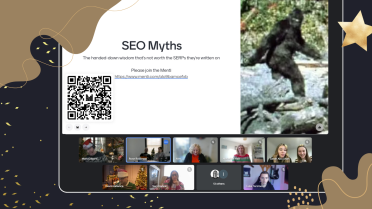We recently hosted a festive and insightful Christmas-themed SEO quiz, led by our Managing Director, Matt Gilbert. The event was a real cracker (pardon the pun), bringing together our fantastic clients for a lively session of SEO myth-busting, mulled wine, and plenty of festive cheer.
Curious to see who came out on top?
You can check out the full leaderboard here, and if you fancy getting involved next time be sure to save the date for our next interactive session on: AI and SEO, happening on Monday, 27th January, 11am–12pm. We’ll share the joining details in the new year!
In the meantime, here’s a festive roundup of the top questions and answers from our Ho, Ho, SEO Christmas quiz, designed to help you steer clear of some of the most common SEO myths.

🎁 Does Google always prefer new content?
Not necessarily. While fresh content can sometimes climb the rankings quickly, especially if it’s newsworthy or relevant to current events, the age of a page isn’t a direct ranking factor. Instead, Google prioritises content that’s high quality, relevant, and helpful to the user. Think of it like a classic Christmas recipe: it doesn’t matter how old it is, as long as it’s still the best option on the table.
🎁 Will duplicate content get you penalised?
No, but it’s still something to avoid. Google doesn’t actively punish sites for having duplicate content. Instead, it identifies the most authoritative version and prioritises that in the rankings. To make sure your content gets the spotlight, use canonical tags and focus on creating original and valuable content.
🎁 Can paid ads improve organic rankings?
Not directly. Paid ads and organic search rankings work independently, but Matt explained how they can complement each other. For example, paid ads can increase brand awareness, which might lead to more people searching for your brand organically. It’s a bit like carolling—once people hear your tune, they’ll come looking for more.
🎁 Do new domains rank as well as older ones?
It’s possible, but it’s harder work. Google doesn’t use domain age as a ranking factor, but older domains often have an advantage because they’ve built up backlinks and trust over time. New domains can still compete by focusing on strong, user-focused content and carefully building their authority, like hanging your first set of fairy lights on a fresh Christmas tree.
🎁 Is tabbed content bad for SEO?
Not at all, as long as it’s done right. Google can crawl and index content hidden behind tabs or accordions. The key is making sure your critical information is accessible to both users and search engines. It’s a bit like presents under the tree, make sure they’re easy to find and worth unwrapping.
🎁 Does Google use Analytics metrics to rank pages?
Nope. Metrics like bounce rate or time spent on a page don’t feed directly into Google’s rankings. However, these figures are useful indicators for you to improve user experience. For example, if visitors leave quickly, it might be a sign that your content isn’t quite hitting the mark. Think of it as feedback for your site, not a judgment from Google.

🎁 Is longer content always better?
Not necessarily. Longer content can perform well if it’s relevant and answers user questions comprehensively. However, shorter content can be just as effective if it provides exactly what the reader is looking for. It’s not about word count; it’s about making your content a perfect fit, like finding the right stocking filler.
🎁 Does bounce rate affect rankings?
No. Bounce rate isn’t a direct ranking factor for Google. However, if users consistently leave your site quickly, it could indicate that your content or user experience needs attention. Think of it as guests leaving your party early, it’s worth finding out why and making changes for the better.
🎁 Is disavowing backlinks a quick fix for SEO problems?
Not really. Overusing the disavow tool can actually harm your site’s performance. Google is pretty good at ignoring spammy backlinks, so you should only use this tool if you’re certain you have unnatural links pointing to your site. It’s a bit like clearing out your decorations, don’t throw away the good ones by mistake.
🎁 Is page speed critical for rankings?
While page speed is important, it’s not the most significant ranking factor. A fast site improves user experience, which is always a good thing, but it won’t make up for poor-quality content. Aim for a balance: a quick-loading site with helpful, user-focused content, like delivering Christmas dinner on time and cooked to perfection.
That’s a wrap (for now)
We thought a Christmas SEO quiz was the perfect way to combine festive fun with a healthy dose of valuable learning. It was fantastic to see so many of our clients sleigh the quiz questions and walk away with well-deserved prizes. Events like this remind us why we love what we do, sharing knowledge and helping businesses confidently navigate the ever-evolving world of SEO.
Looking for support with your SEO or digital marketing strategy? Check out our SEO services. And don’t forget to mark your calendars for our upcoming AI and SEO event on Monday, 27th January, 11am–12pm.
Until then, keep your SEO strategies merry and bright!

